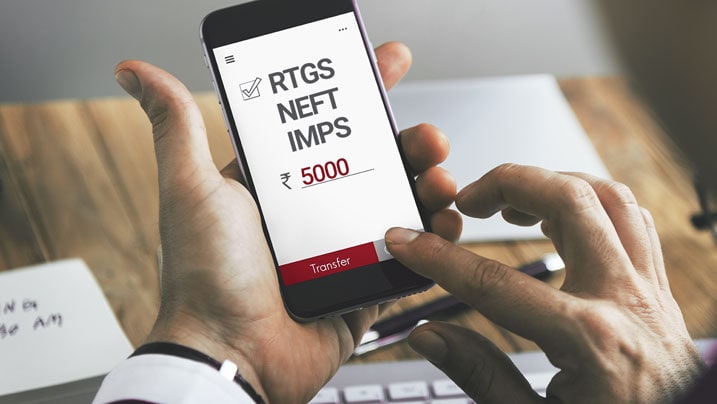CKYC Registry
-
Customer Service Contact us Service request Locate a branch
Find all the help you need
Scan the QR, get our app, and find help on your fingertips

Help CenterSupport topics, Contact us, FAQs and more
-
Login
Are you ready for an upgrade?
Login to the new experience with best features and services
-
Login
Are you ready for an upgrade?
Login to the new experience with best features and services
- Accounts
-
Deposits
IDFC FIRST Bank Deposits
View all Deposits -
Loans
IDFC FIRST Bank Loans
View all Loans - Wealth & Insure
-
Payments
IDFC FIRST Bank Payments
View all Payments -
Cards
IDFC FIRST Bank Cards
View all Cards - Blogs
- Corporate Account
-
Cash Management Services
IDFC FIRST Bank Cash Management Services
View all Cash Management Services - Supply Chain Finance
-
Corporate Lending
IDFC FIRST Bank Lending
View all -
Treasury
IDFC FIRST Bank Treasury
See more details - NBFC Financing
Support topics, Contact us, FAQs and more
- IDFC FIRST Bank Accounts
-
Savings Account
-
Corporate Salary
Account -
Senior Citizens
Savings Account -
First Power
Account -
Current Account
-
NRI Savings
Account -
TASC Institutional
Account -
Savings Account
Interest Calculator
- IDFC FIRST Bank Deposits
-
Fixed Deposit
-
Recurring Deposit
-
NRI Fixed Deposit
-
Safe Deposit Locker
-
FD Calculator
-
RD Calculator
- IDFC FIRST Bank Loans
-
Personal Loan
-
Consumer Durable
Loan -
Home Loan
-
Business Loan
-
Professional Loan
-
Education Loan
-
New Car Loan
-
Pre-owned Car Loan
-
Two Wheeler Loan
-
Pre-owned Two
Wheeler Loan -
Commercial Vehicle
Loan -
Gold Loan
-
Loan Against Property
-
Loan Against Securities
-
Easy Buy EMI card
-
Personal Loan
EMI Calculator -
Education Loan
EMI Calculator -
Home Loan
EMI Calculator
- IDFC FIRST Bank Wealth & Insure
-
FIRST Select
-
FIRST Wealth
-
FIRST Private
-
Mutual Funds
-
Sovereign Gold Bond
-
Demat Account
-
Term Insurance
-
Life Insurance
-
Health Insurance
-
General Insurance
-
Bonds
-
Loan Against
Securities -
Portfolio Management
Service
- IDFC FIRST Bank Payments
-
FASTag
-
Credit Card
Bill Payments -
UPI
-
Funds Transfer
-
Forex Services
-
Pay Loan EMI
- IDFC FIRST Bank Cards
-
Ashva :
Metal Credit Card -
Mayura :
Metal Credit Card -
FIRST Millennia
Credit Card -
FIRST Classic
Credit Card -
FIRST Select
Credit Card -
FIRST Wealth
Credit Card -
FIRST WOW!
Credit Card -
Deals
-
Debit Cards
-
Co-branded Cards
-
Credit Card
EMI Calculator -
FIRST Corporate
Credit Card -
FIRST Purchase
Credit Card -
FIRST Business
Credit Card
- Premium Metal Credit Cards
-
AshvaLifestyle1% Forex₹2,999
-
MayuraLifestyleZero Forex₹5,999
-
FIRST PrivateInvite Only
- Best for travellers
-
MayuraZero ForexMetal₹5,999
-
Ashva1% ForexMetal₹2,999
-
FIRST WOW!Zero ForexTravelLifetime Free
-
FIRST SWYPTravel OffersEMI₹499
-
FIRST Select1.99% ForexLifestyleLifetime Free
-
FIRST Wealth1.5% ForexLifestyleLifetime Free
-
Club VistaraTravelLifestyle₹4,999
-
IndiGo IDFC FIRST Dual Credit CardTravelLifestyle₹4,999
- Max benefits, Free for life
-
FIRST Classic10X RewardsShoppingNever Expiring Rewards
-
FIRST Millennia10X RewardsShoppingNever Expiring Rewards
-
FIRST Select10X RewardsLifestyle1.99% Forex
-
FIRST Wealth10X RewardsLifestyle1.5% Forex
-
FIRST WOW!RewardsTravelZero Forex
-
LIC ClassicRewardsInsuranceShopping
-
LIC SelectRewardsInsuranceShopping
- Reward Multipliers
-
AshvaLifestyleMetal₹2,999
-
MayuraLifestyleZero Forex₹5,999
-
FIRST ClassicNever Expiring RewardsShoppingLifetime Free
-
FIRST MillenniaNever Expiring RewardsShoppingLifetime Free
-
FIRST SelectNever Expiring RewardsLifestyleLifetime Free
-
FIRST WealthNever Expiring RewardsLifestyleLifetime Free
- Rewards & Credit on UPI
-
FIRST Power+FuelUPI₹499
-
FIRST PowerFuelUPI₹199
-
FIRST EA₹NVirtual1% Cashback₹499
-
FIRST DigitalVirtualUPI₹199
-
IndiGo IDFC FIRST Dual Credit CardUPITravelDual cards
- Fuel and Savings
-
FIRST PowerRewardsUPI₹199
-
FIRST Power+RewardsUPI₹499
-
LIC ClassicRewardsInsuranceShopping
-
LIC SelectRewardsInsuranceShopping
- Express and Flaunt
-
AshvaMetal1% Forex₹2,999
-
MayuraMetalZero Forex₹5,999
-
FIRST SWYPEMIOfferMAX₹499
-
FIRST MillenniaRewardsShoppingLifetime Free
- FD Backed rewarding Credit Cards for all
-
FIRST EA₹NVirtualCashback₹499
-
FIRST WOW!Zero ForexTravelLifetime Free
-
CreditPro Balance TransferTransfer & SaveReduce InterestPay Smartly
- IDFC FIRST Bank NRI Forex Solutions
-
Send money to India-Wire transfer
-
Send money to India-Digitally
-
Send money abroad
-
Max Returns FD (INR)
- IDFC FIRST Bank MSME Accounts
-
Platinum Current
Account -
Gold
Current Account -
Silver Plus
Current Account -
Merchant Multiplier
Account -
Agri Multiplier
Account -
TASC Institutional
Account -
Dynamic Current
Account -
World business
Account -
First Startup
Current Account
- IDFC FIRST Bank Business Loans
-
Business Loan
-
Professional Loan
-
Loan Against Property
-
Business Loan for Women
-
Working Capital Loan
-
Construction Equipment Loan
-
Machinery Loan
-
Healthcare Equipment Loan
- IDFC FIRST Bank Business Solutions
-
Payment Solutions
-
Tax Payments
-
Doorstep Banking
-
Point of Sale (POS)
-
Escrow Accounts
-
NACH
-
Payment Gateway
-
UPI
-
Virtual Accounts
-
As per amendment in the Income Tax Rules, PAN or Aadhaar are to be mandatorily quoted for cash deposit or withdrawal aggregating to Rupees twenty lakhs or more in a FY. Please update your PAN or Aadhaar. Kindly reach out to the Bank’s contact center on 1800 10 888 or visit the nearest IDFC FIRST Bank branch for further queries.
-
-
Most Searched
Sorry!
We couldn’t find ‘’ in our website
Here is what you can do :
- Try checking the spelling and search
- Search from below suggestions instead
- Widen your search & try a more generic keyword
Suggested
Get a Credit Card
Enjoy Zero Charges on All Commonly Used Savings Account Services
Open Account Now
Finance
Differences between RTGS, NEFT and IMPS
Summary: Online money transfer has offered the convenience to send money anywhere anytime. You can opt for different types of payment modes such as IMPS, RTGS, and NEFT depending on the amount being transferred. Read on to know the differences between RTGS, NEFT and IMPS.
Money Transfer Options
Transferring money from one bank account to another is a transaction that is either commercial or domestic. When you transfer money from one bank account to another, you do so by debiting the sender’s account and crediting the receiver’s account. Since fund transfer involves two correspondent banks, the Reserve Bank of India (RBI), the Central Banking Institution of India responsible for the monetary policy and regulating banking services, devises protocols for effecting money transfers between two banks.
With the advent of internet banking and availability of highly sophisticated technology, online money transfer process is gaining ground and increasingly people and commercial establishments use the online money transfer facility. The days of using cheques and demand drafts for effecting money transfers are almost over.
RBI regulates fund transfer policies and processes between banks through its Board for Regulation and Supervision of Payment and Settlement Systems (BPSS). Since fund transfer involves the transfer of funds from one bank to another, a payment and settlement system is necessary and fund transfers come under the Payment and Settlement Systems Act, 2007 (PSS Act).
RBI controls and regulates money transfer through three main options based on the particular requirements of customers using the facility. The three main money transfer options are:
- RTGS – Real Time Gross Settlement
- NEFT – National Electronic Funds Transfer
- IMPS – Immediate Payment Service
READ MORE
IDFC FIRST Bank offers all the three money transfer options i.e. IMPS, RTGS, and NEFT, completely free of charge at branches and net banking along with over zero fees on common services on its savings bank account. In addition to online money transfer, you enjoy unlimited ATM withdrawals across the country, free debit card and DD issuance, free cheque book re-issuance and no charges on setting up e-mandates for automatic payments. Opening a savings account with IDFC FIRST Bank also provides you with one of the highest interest rates in the sector with monthly interest payout to enhance savings.
RTGS
RTGS is a convenient way of transferring funds quickly and efficiently. As the name suggests, the transfer of money takes place in real time and funds get transferred from the sender’s account to the receiver’s account almost immediately. The main features of online RTGS through IDFC FIRST Bank include:
- Real-time settlement on an order-by-order basis – RBI stipulates remittance within 30 minutes of transfer
- Funds settlement takes place in the books of RBI through its InterBank Transfer Scheme, making the transaction final and irrevocable. RBI communicates the transfer to the remitting bank who in turn communicates to the remitter
- RTGS is available 24X7, throughout the year, including Sundays and bank holidays.
- RTGS transactions during non-banking hours above ₹10 lakh will be credited the next working day
- Minimum transfer amount is ₹2,00,000
- Maximum transfer limit is ₹20,00,000
- You can do RTGS transfer through the bank branch or you can do online RTGS through Internet banking
- RTGS transfer is free
- RTGS service available only if the receiving bank branch is RTGS enabled
NEFT
In the NEFT process, RBI pools NEFT transfer requests from participating banks and effects batch wise transfers under the Deferred Net Settlement (DNS) system. The main features of NEFT include -
- Settlement on an order by order basis through the batch system – RBI stipulates remittance within 2 hours of transfer
- Funds settlement takes place in the books of RBI through its InterBank Transfer Scheme, making the transaction final and irrevocable. RBI communicates the transfer to the remitting bank who in turn communicates to the remitter
- NEFT transactions during non-banking hours above ₹10 lakh will be credited the next working day
- Minimum transfer amount is ₹1
- Maximum transfer limit is ₹20,00,000
- You can do NEFT transfer through the bank branch or you can do online NEFT through Internet banking
- NEFT transfer is free
- NEFT service available only if the receiving bank branch is NEFT enabled
NEFT is suitable for funds transfers below ₹2,00,000 as RTGS does not accept transfers of amounts below ₹2,00,000.
IMPS
In the IMPS system, the National Payments Corporation of India (NPCI) facilitates the transfer of funds between member banks. IMPS provides real-time fund transfer service on multiple channels such as mobile, Internet, ATM and SMS. IDFC’s IMPS service provides features which include:
- Settlement on an order by order basis 24/7 instantaneously
- Transfer to receivers’ bank accounts through IFSC
- Instant confirmation to sender and receiver
- IMPS window is always open
- Minimum transfer amount is ₹1
- Maximum transfer limit is ₹2,00,000 per transaction subject to a maximum limit of ₹20,00,000
- You can do IMPS transfer only through Internet banking and mobile banking channel
- IMPS transfer is free
- IMPS service available only if the receiving bank branch is a member of NPCI
IMPS is an excellent fund transfer system when you want to transfer funds urgently.
IDFC FIRST Bank is technologically advanced to transfer online funds from your IDFC FIRST Bank account to any other account anywhere in India provided that the receiver’s bank is a participant in the RTGS, NEFT and IMPS system available to participating banks. For large amounts above ₹2,00,000 and up to ₹20,00,000, you can use the RTGS transfer facility. For amounts less than ₹2,00,000 you can use NEFT facility. For instantaneous transfer of funds up to a maximum of ₹2,00,000 you can use the IMPS facility.
Disclaimer
The contents of this article/infographic/picture/video are meant solely for information purposes. The contents are generic in nature and for informational purposes only. It is not a substitute for specific advice in your own circumstances. The information is subject to updation, completion, revision, verification and amendment and the same may change materially. The information is not intended for distribution or use by any person in any jurisdiction where such distribution or use would be contrary to law or regulation or would subject IDFC FIRST Bank or its affiliates to any licensing or registration requirements. IDFC FIRST Bank shall not be responsible for any direct/indirect loss or liability incurred by the reader for taking any financial decisions based on the contents and information mentioned. Please consult your financial advisor before making any financial decision.
The features, benefits and offers mentioned in the article are applicable as on the day of publication of this blog and is subject to change without notice. The contents herein are also subject to other product specific terms and conditions and any third party terms and conditions, as applicable. Please refer our website www.idfcfirstbank.com for latest updates.























